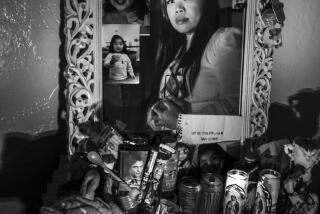Audrie Pott case: Investigators ‘still trying to piece it together’
Authorities have served multiple search warrants and seized computers and cellphones during their investigation into 15-year-old Audrie Pott‘s alleged sexual assault and suicide, but are still trying to figure out exactly what happened, a sheriff’s official said.
Deputy Kurtis Stenderup, spokesman for the Santa Clara County Sheriff’s Department, told The Times on Monday that officials “really are hampered” because “getting kids to cooperate is difficult.”
“Audrie committed suicide, and then we were told of a possible sexual assault that occurred,” Stenderup said. “We’re working backward. We’re still trying to piece it together. ... Multiple search warrants were written and served, and multiple computers and multiple cellphones were seized.”
Stenderup confirmed that the three suspects arrested last week were students at Saratoga High School -- Audrie’s school -- when the incident occurred and that one of the youths had since transferred.
The suspects, arrested Thursday, are scheduled to appear in juvenile court Tuesday on charges of misdemeanor sexual battery, felony distribution of child pornography and felony forcible sexual penetration in an incident that raises questions of exactly what cyber-bullying means.
Audrie had been drinking during a Labor Day weekend party at a friend’s house in the pricey Silicon Valley suburb of Saratoga. She either fell asleep or passed out. And she woke up to something her family’s lawyer described as “unimaginable.”
“There were some markings on her body, in some sort of permanent marker, indicating that someone had violated her when she was sleeping,” attorney Robert Allard said Monday. On Audrie’s leg was a message, Allard said, that included a boy’s name and the words “was here.”
“They drew on her, in addition to doing what they did.”
And they -- three 16-year-olds who had been Audrie’s friends since middle school -- are suspected by authorities of taking at least one cellphone photo of the sophomore while she was unconscious and later showing it to 10 or more classmates.
The case made international headlines last week after Allard said that images had spread among students at Saratoga High “like wildfire” and that at least one photo had been posted on the Internet. Parallels were made to high-profile cases in Nova Scotia and Steubenville, Ohio.
On Monday, however, Allard and Audrie’s family acknowledged that there probably was just one photo, and that it had not been posted on Facebook or widely distributed.
But as Audrie’s stepmother, Lisa Pott, said during an emotional news conference, flanked by enormous photos of the girl: So what?
“We don’t know if they were posted,” she said. “We do know that images were taken. ... Audrie [likely] saw people huddled around cellphones. ... In her opinion, the whole school was talking about it.”
In a statement released after the arrests, attorneys for the three suspects said that much of what had been reported in the media was inaccurate. What they described in the statement as “most disturbing” was “the attempt to link [Audrie’s] suicide to the specific actions of these three boys.”
Lisa Pott said that the family “had no idea what happened to Audrie until after her memorial service.” But after talking with her friends, checking her Facebook account and looking at her cellphone, a picture began to emerge. The family started its own investigation.
“We were able to find statements made by Audrie herself in the last week of her life that draws a direct connection between her death and what the three young men did to her,” Lisa Pott said.
And then she read the young girl’s words, culled, she said, from messages Audrie had sent to her friends on Facebook:
“My life is over.”
“I’m in hell. Everyone knows about that night.”
“My life is ruined and I don’t even remember how.”
“I have a reputation for a night I don’t even remember and the whole school knows.”
At Saratoga High, the original assertion that the whole school knew about events that unfolded at a party attended by about a dozen young people left some students angry.
It was the school’s newspaper, the Saratoga Falcon, that first reported about 10 students on the campus of about 1,400 had been shown an image of Audrie at what Allard described as her most “vulnerable.”
On Monday, the Falcon’s student editors posted a message on their newspaper site saying that, even though the picture had not been widely distributed, it still constituted cyber-bullying because Audrie believed it was.
Which, said cyber-bullying expert Brendesha Tynes, is exactly the point.
“If a teenager felt that everyone else had that negative perception of them,” said Tynes, an associate professor at USC, “I could see it causing a person grave emotional damage, depressive symptoms, anxiety, suicidal thoughts -- everything that we see Audrie Pott experiencing.”
ALSO:
Boston explosions prompt tighter security across L.A.
Dozens line up for meningitis vaccine in West Hollywood
Corruption convictions reduced for former South Gate official
maria.laganga@latimes.com
kate.mather@latimes.com
Times staff writer Lee Romney in San Francisco contributed to this report.
More to Read
Sign up for Essential California
The most important California stories and recommendations in your inbox every morning.
You may occasionally receive promotional content from the Los Angeles Times.












